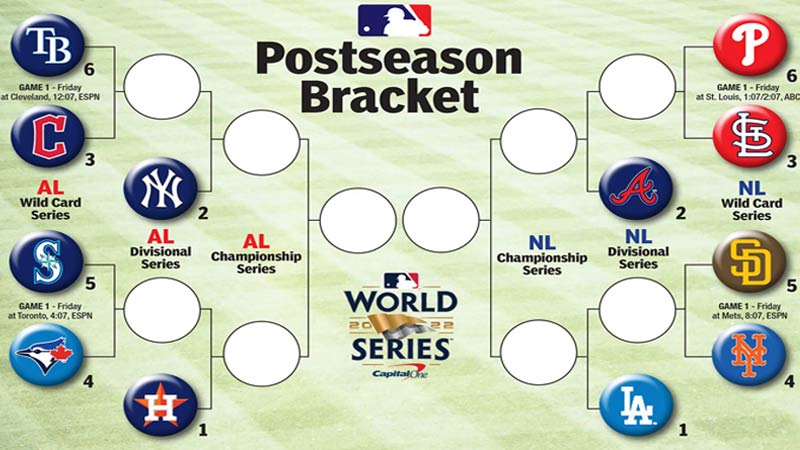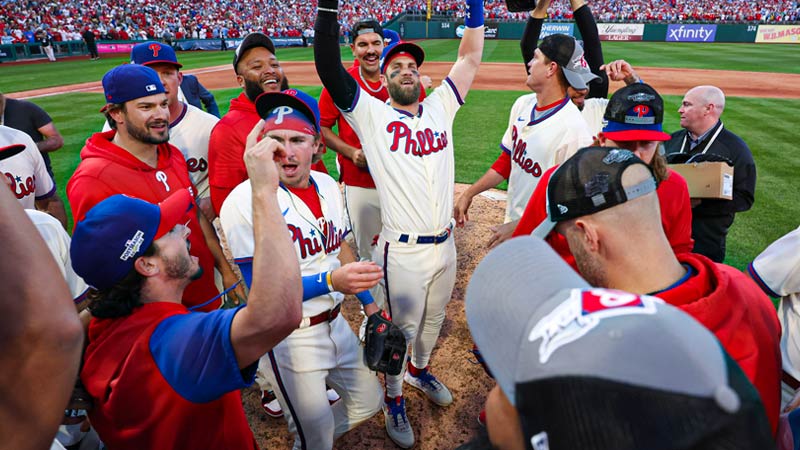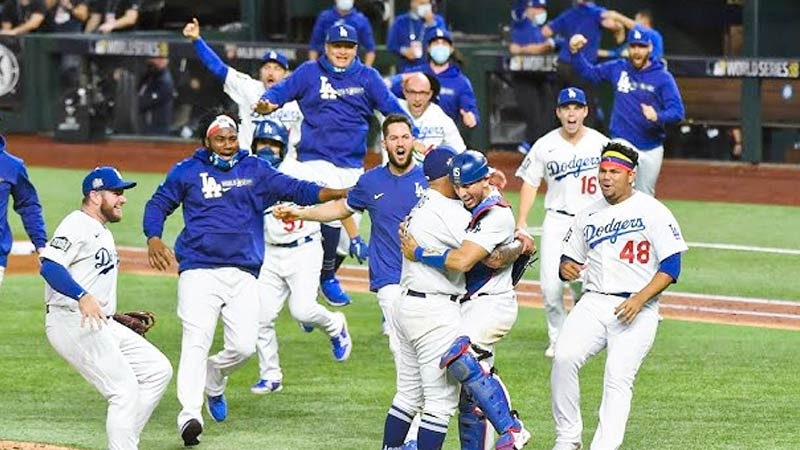As the regular MLB season draws to a close, baseball fans around the world eagerly anticipate the thrilling postseason tournament known as the MLB Playoffs.
This annual event determines the champions of the American League and the National League, ultimately culminating in the World Series, where the two league champions vie for the coveted title of MLB World Series champion.
A fundamental question that arises among both seasoned fans and newcomers to the sport is, “How many teams make the MLB Playoffs?”
In this comprehensive guide, we will address this and other frequently asked questions, shedding light on the playoff structure and the teams’ journey to October glory.
What are MLB Playoffs?
The MLB Playoffs, also known as the Major League Baseball Playoffs, is an annual postseason tournament held at the end of the regular baseball season in Major League Baseball (MLB).
The playoffs determine the champion of the league, with the two best teams from each league (American League and National League) competing against each other to win the World Series title.
The MLB regular season consists of 162 games for each team and the top five teams from each league advance to the playoffs. The playoff format has evolved over the years, and the postseason structure was as follows:
Wild Card Games
The two teams with the best records that did not win their respective divisions play a one-game Wild Card playoff. The winner advances to the Division Series.
Division Series
The Division Series is a best-of-five format, with the three division winners from each league and the Wild Card winner competing against each other. The two winners from each Division Series advance to the League Championship Series.
League Championship Series (LCS)
The LCS is a best-of-seven format where the winners of the Division Series from each league face off. The victorious team from each LCS becomes their league’s champion.
World Series
The champions of the American League and National League face each other in the World Series, which is a best-of-seven series. The team that wins four out of the seven games becomes the MLB World Series champion for that year.
The MLB Playoffs are highly anticipated by fans and players alike, as they showcase the best teams and talent from the regular season competing for the ultimate prize in baseball, the World Series title.
The postseason typically takes place in October and can extend into early November, depending on the length of the series and the number of games played.
How Many Teams Make the MLB Playoffs?

Source: nypost.com
In the current MLB postseason format, 12 teams qualify for the playoffs each year. This expanded format was implemented recently and features six teams from both the American League and the National League. Here are the key points regarding how many teams make the MLB playoffs:
Total Teams
The MLB playoffs include a total of 12 teams. This number is higher than in previous years when the postseason featured only 10 teams.
Two Leagues
The 12 qualifying teams are divided equally between the American League and the National League, with six teams from each league making it to the playoffs.
American League Teams
In the American League, there are three divisions: East, Central, and West. The three division winners from the American League automatically qualify for the playoffs.
American League Wild Card Teams
In addition to the three division winners, three Wild Card teams also make it to the playoffs from the American League. These Wild Card teams are the non-division-winning teams with the best records in the league.
National League Teams
Similarly, the National League also consists of three divisions: East, Central, and West. The winners of these divisions secure spots in the playoffs.
National League Wild Card Teams
Apart from the division winners, the National League also has three Wild Card teams that advance to the playoffs. These Wild Card teams are the non-division-winning teams with the best records in the National League.
Competitive Postseason
The expanded 12-team playoff format adds excitement and competitiveness to the MLB postseason. More teams have the opportunity to compete for the ultimate goal of winning the World Series title.
World Series
Following the Division Series and League Championship Series, the two league champions face off in the World Series. The team that wins the best-of-seven World Series becomes the MLB World Series champion.
The 12-team MLB playoff format has been well-received by fans and players alike, as it allows for a broader representation of teams and increases the stakes and drama of the postseason. Each team that qualifies for the playoffs has a shot at the coveted World Series title, making the MLB postseason an intense and thrilling competition.
How The Playoff Teams Are Seeded in MLB?

Source: metsmerizedonline.com
In Major League Baseball (MLB), the playoff teams are seeded according to their regular season records in both the American League and National League. The seeding process determines the positions of the teams in the postseason tournament and is based on the following criteria:
No. 1 seed: The Best Regular Season Record in the League
The team with the highest number of wins in either the American League or the National League will be awarded the No. 1 seed. This team has demonstrated superior performance throughout the regular season and is recognized as the top-seeded team heading into the playoffs.
No. 2 seed: The Division Winner with the Second-best Record
The No. 2 seed is granted to the team that won its division (one of three divisions in each league) and achieved the second-best regular season record in that league. This team is rewarded for winning its division and having a strong performance throughout the season.
No. 3 seed: The Division Winner with the Third-best Record
Similar to the No. 2 seed, the No. 3 seed is awarded to the team that won its division and obtained the third-best record in the league. This team might not have performed as well as the No. 1 and No. 2 seeds, but they still secured their division title, which earns them a higher seeding.
No. 4 seed: The Wild Card Team with the Best Record
The wild card teams are the top non-division-winning teams in each league. The No. 4 seed is given to the wild card team with the best regular season record among all wild card teams. This allows them to enter the playoffs with a relatively higher seeding despite not winning their division.
No. 5 seed: The Wild Card Team with the Second-best Record
The second-highest-ranked wild card team is awarded the No. 5 seed. Like the No. 4 seed, this team earned its spot in the playoffs based on a strong performance in the regular season, even though they did not win their division.
No. 6 seed: The Wild Card Team with the Third-best Record
The last wild card team to make the playoffs receives the No. 6 seed. They have the third-best record among all wild card teams, and although they might not have had as dominant a regular season as the higher seeds, they still have a chance to compete in the postseason.
Once the seeding process is complete, the playoff teams are organized into a bracket, and the postseason tournament begins. The higher-seeded teams are granted home-field advantage, which means they get to host more games in each series, potentially giving them an edge in the playoffs.
The seeding system in MLB ensures that the teams with the best regular season records are rewarded with higher positions, offering them a more favorable path to the World Series.
However, the playoffs are also an opportunity for lower-seeded teams to showcase their abilities and potentially upset higher-ranked opponents on their journey to becoming the MLB World Series champion.
Rounds and Match-ups in MLB Playoffs
The MLB Playoffs consist of several rounds, each featuring specific match-ups between the qualifying teams. The postseason format can vary slightly from year to year, but the following rounds and match-ups are typically involved in the MLB Playoffs:
Wild Card Games
- The playoffs begin with the Wild Card Games, where the two wild card teams from each league face off in a single-elimination game.
- In the American League, the No. 4 seed (wild card team with the best record) plays against the No. 5 seed (wild card team with the second-best record).
- In the National League, the No. 4 seed (wild card team with the best record) plays against the No. 5 seed (wild card team with the second-best record).
- The winners of these games advance to the Division Series.
Division Series
- The Division Series is a best-of-five format and features the three division winners from each league and the wild card winner from each league.
- In the American League, the No. 1 seed (best regular season record) plays against the Wild Card Game winner, and the No. 2 seed (division winner with the second-best record) plays against the No. 3 seed (division winner with the third-best record).
- In the National League, the No. 1 seed (best regular season record) plays against the Wild Card Game winner, and the No. 2 seed (division winner with the second-best record) plays against the No. 3 seed (division winner with the third-best record).
- The winners of the Division Series advance to the League Championship Series.
League Championship Series (LCS)
- The LCS is a best-of-seven format, and it determines the champion of each league.
- The American League Championship Series features the two winners from the American League Division Series.
- The National League Championship Series features the two winners from the National League Division Series.
- The winners of the ALCS and NLCS become the league champions and move on to the World Series.
World Series
- The World Series is the final round of the MLB Playoffs and is also a best-of-seven format.
- The champions of the American League and National League face off against each other to compete for the title of MLB World Series champion.
- The team that wins four out of the seven games in the World Series becomes the overall champion of Major League Baseball.
Each round of the MLB Playoffs narrows down the field of teams until only two remain to compete in the World Series. The postseason is a thrilling and intense period for baseball fans, as they witness the best teams in the league battle it out for the ultimate prize.
Note that the specific format or number of teams involved in the playoffs may have changed after my last update, so it’s always a good idea to check the current MLB Playoff structure for the most up-to-date information.
Significance of MLB Playoffs in Baseball
The MLB Playoffs hold immense significance in baseball for several reasons:
Determining the League Champions
The playoffs determine the champions of the American League and the National League. The teams that win their respective League Championship Series (LCS) earn the title of league champions, which is a prestigious achievement in itself.
Road to the World Series
The playoffs are the pathway to the ultimate goal for every MLB team – the World Series. The two league champions face off in the World Series to compete for the title of MLB World Series champion, the highest honor in baseball.
Heightened Competition
The postseason features the best teams from the regular season, creating intense and highly competitive games. Teams must perform at their best to advance through each round, leading to exciting and dramatic matchups.
Expanded Fan Engagement
The playoffs draw enormous attention from baseball fans all over the world. As the stakes get higher, fan engagement increases, leading to higher TV ratings, ticket sales, and overall interest in the sport.
Legacy and History
The MLB Playoffs are deeply ingrained in baseball’s history and tradition. Winning a World Series title cements a team’s place in baseball history, and legendary performances in the playoffs become iconic moments in the sport’s lore.
Players’ Showcase
The playoffs provide players with a platform to showcase their skills on a big stage. Outstanding performances in the playoffs can elevate a player’s reputation and potentially lead to accolades like the Most Valuable Player (MVP) award or lucrative contracts in the future.
Comeback Stories
The playoffs offer opportunities for comeback stories. Teams that faced adversity during the regular season can turn their fortunes around and make a deep postseason run, providing inspiration and hope to fans and players alike.
Postseason Legends
The MLB Playoffs have produced numerous iconic moments and legendary players who have solidified their status as postseason heroes. Names like Derek Jeter, Reggie Jackson, and Babe Ruth are forever linked to playoff greatness.
Economic Impact
The playoffs have significant economic implications for MLB and the cities hosting the games. Increased merchandise sales, ticket revenue, and tourism all contribute to the local economies.
Unpredictability and Drama
The playoffs are unpredictable, and even the best teams can be eliminated by an underdog. The drama and tension in each game add to the excitement, making it an enthralling experience for both die-hard and casual fans.
The MLB Playoffs are a culmination of a long and grueling regular season, providing fans and players alike with thrilling moments, memorable performances, and the crowning of a new MLB World Series champion. It is an annual celebration of America’s pastime and serves as a unifying force in the baseball community.
FAQs
What is the format of the MLB Playoffs?
The MLB Playoffs feature a multi-tiered format comprising several rounds. The postseason starts with the Wild Card Games, where the two wild card teams from each league compete in a single-elimination game.
The winners advance to the Division Series, followed by the League Championship Series (LCS). Finally, the two league champions face off in the World Series to determine the MLB World Series champion.
How many teams qualify for the MLB Playoffs?
In each league (American League and National League), a total of five teams qualify for the playoffs. These teams include the three division winners from each league and two wild card teams. The wild card teams are the non-division-winning teams with the best records in their respective leagues.
How are the teams seeded in the playoffs?
Before the playoffs begin, each team in both leagues is seeded between 1 and 5 based on specific criteria. The No. 1 seed goes to the team with the best regular season record in the league.
The No. 2 seed is given to the division winner with the second-best record, and so on. The wild card teams are seeded as No. 4 and No. 5, depending on their regular season records.
How many games are played in each playoff round?
The number of games played in each playoff round varies. The Wild Card Games are single-elimination, with one game determining the winner.
The Division Series is a best-of-five format, and the League Championship Series, as well as the World Series, are both best-of-seven formats. The team that wins the majority of games in each series advances to the next round.
When do the MLB Playoffs take place?
The MLB Playoffs typically begin in early October and extend through October and sometimes into early November, depending on the length of the series and the number of games played. The exact schedule and dates may vary from year to year.
End call
The MLB Playoffs hold a special place in the hearts of baseball fans, serving as the culmination of a season filled with intense competition and remarkable performances.
With only a select few teams earning the right to compete, the playoffs showcase the best of the best, and each game becomes a battle of skill, strategy, and passion.
Understanding how many teams make the MLB Playoffs, their seeding, and the playoff format provides fans with a deeper appreciation for the journey each team undertakes to reach the pinnacle of baseball success – the World Series.
So, as the regular season nears its end, let us embrace the excitement of the playoffs and celebrate the culmination of another remarkable year in America’s favorite pastime. Best of luck.







